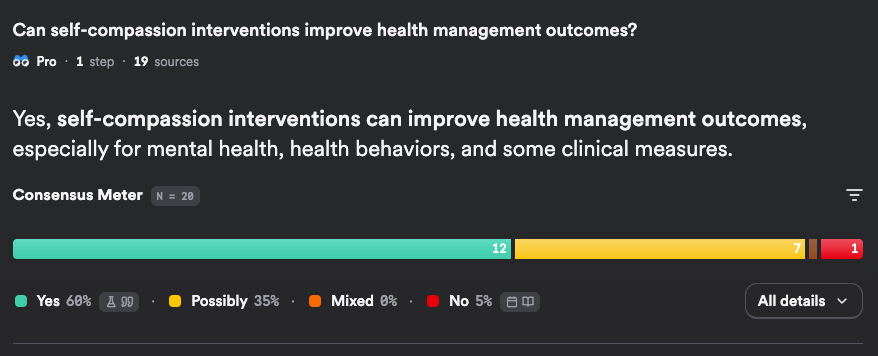ReadersKey™: Building Awareness and Self-Compassion
Research Edition - Decode Your Diagnosis - Chapter 12
Awareness & Self-Compassion
“Understanding your own suffering is not self-indulgence, it’s self-rescue.”
Originally when I started researching this chapter I thought it would be difficult and I wasn’t wrong. It would seem that we don’t pay enough attention as a society to self-awareness and self-compassion.
I did however find a correlation between self-compassion and chronic condition management. Like I said though there wasn’t a lot to go on.
For instance, I can generally get the N value of questions for other chapters above 100 professionals, however in this instance N=20, but it’s a consensus in the affirmative despite the need for further study and validation.
DECODE
Why Self-Compassion Is a Clinical Tool, Not a Cliché
We often think of self-compassion as soft. Gentle. Passive. But research tells a different story: self-compassion is one of the most potent psychological interventions available for those living with chronic illness.
A 2024 meta-analysis found that self-compassion practices significantly reduce depression, anxiety, and distress, with moderate to large effect sizes across diverse conditions from diabetes and chronic pain to neurological and autoimmune disorders (Baxter & Sirois, 2024).
Self-compassion isn’t just soothing; it’s strategic.
It helps regulate emotions, calms physiological stress responses, and rewires the body’s ability to cope. It allows us to face discomfort without flinching, and without self-blame.
And here’s the kicker: both online and in-person programs work, though engaging young people and keeping them in the game can be a challenge (Kılıç et al., 2020). For adults with chronic illness, however, the outcomes are clear:
More compassion, more capacity.
Self-compassion mediates improvements in well-being. It’s not a luxury, it’s medicine.
ALIGN
Try This: A “Three Lens” Awareness Check-In
Borrowing from the research of Neff (2022) and Kirschner et al. (2019), try this alignment tool drawn from Mindful Self-Compassion and Compassion-Focused Therapy models.
Three Reflective Lenses:
Self-Kindness → What would I say to a friend in this exact situation?
Common Humanity → Who else might be experiencing this right now?
Mindful Presence → What’s here, right now, without judgment or analysis?
Each of these lenses interrupts the inner critic and activates what researchers call soothing-system arousal — a neurophysiological state linked to emotional regulation, vagal tone, and social connection.
Start by taking one situation from your week and walk it through all three lenses. Let go of fixing. Just observe the shift.
This is self-awareness in action , not as introspection, but as recalibration.
Bonus tip:
Self-compassion training often works best in groups so if you’re feeling isolated, consider joining the Titans Arena to follow discussion threads or participate in a self-awareness workshop.
THRIVE
From Critic to Companion: A Titan’s Quiet Revolution
One of our readers recently shared how she had spent years internalizing the “tough it out” mindset. After a diagnosis of fibromyalgia, she began to explore what it would mean to treat herself like someone she loved.
Her shift wasn’t dramatic, but it was decisive.
She began writing herself short letters each week and sure, at first they were awkward but over time, they became compassionate check-ins. She now uses them as personal data points, tracking her tone, her energy, her growth.
This is the hidden power of self-compassion: it builds tracking habits not just of symptoms, but of self-trust.
As Kirschner et al. (2019) note, the physiological changes (like increased heart rate variability) are real, but so are the psychological ones. We don’t just heal faster.
We suffer less.
FAMA’S NUDGE
Awareness without kindness becomes criticism. Kindness without awareness becomes avoidance. It’s only when the two walk together that we truly grow.
SOURCES
Baxter, R., & Sirois, F. (2024). Self‐compassion and psychological distress in chronic illness: A meta‐analysis. BJHP
Kılıç, A., et al. (2020). Effectiveness of Self-Compassion-Related Interventions. Behavior Therapy
Neff, K. (2022). Self-Compassion: Theory, Method, Research. Annual Review of Psychology
Kirschner, H., et al. (2019). Soothing Your Heart and Feeling Connected. Clinical Psychological Science




